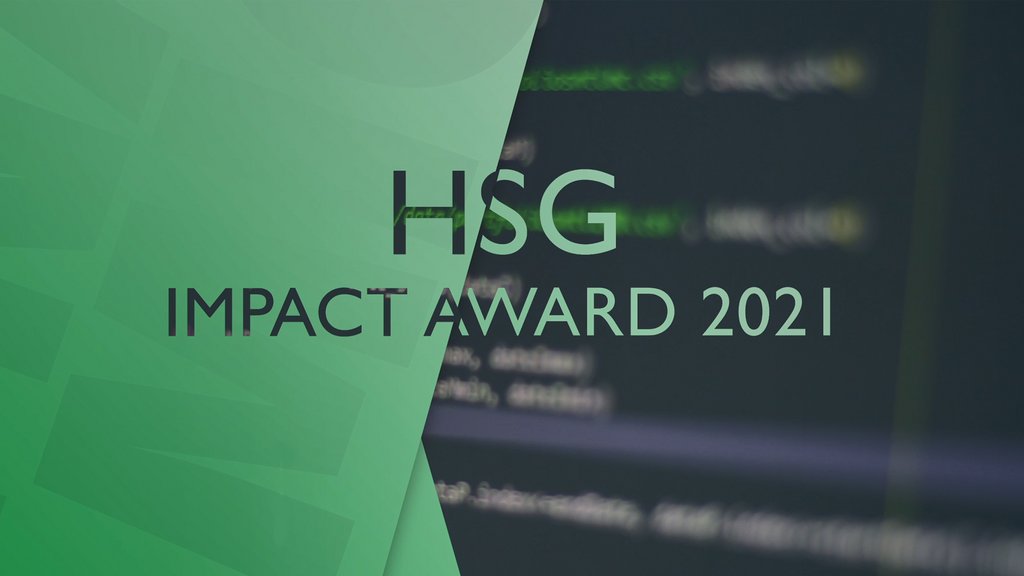Research - 25.05.2021 - 00:00
Three research projects given the "HSG Impact Award 2021"
This year, the University of St.Gallen (HSG) is conferring the HSG Impact Awards for the fourth time. HSG researchers will receive awards for the valuable contribution they make to society through their projects. Three awards are being conferred: to the research project "An integrated approach to generate higher impact portfolios" by Prof. Dr. Sebastian Utz; to the project "Monitoring Consumption Switzerland" by Prof. Dr. Martin Brown and Prof. Dr. Matthias Fengler and to "Staying on Top of the Crisis: Tracking the Economic and Social Impacts of SARS CoV 2 and Future Disasters to Improve Global Disaster Management and Response Efforts" by Prof. Dr. Charlotta Sirén, Research Associate Michael Hudecheck, Prof. Ph.D. Joakim Vincent and Prof. Dr. Dietmar Grichnik.

25 May 2021. The HSG Impact Awards acknowledge research projects at the University of St.Gallen which have an especially clearly recognisable impact on society. The jury, consisting of practitioners and university members, assessed applications from various HSG research disciplines. This year, the awards will be presented as part of the virtual interactive Dies academicus this coming Saturday, 29 May 2021 from 10 a.m..
Sustainable investment strategies
Sustainable investments are among the most important trends on capital markets. They take account of traceable criteria from the fields of environment, social and responsible corporate management. At the University of St.Gallen, Prof. Dr. Sebastian Utz has developed a new portfolio model. It optimises reciprocal risk, return and sustainability impact and enables unused sustainability to be identified in the investments and the capital to be redirected to sustainable challenges. We found a partner in the Alternative Bank Schweiz for the practical implementation of the new fund management. The aim is to establish the new portfolio tool in banking and make a contribution towards the current environmental and social challenges facing our society.

Portfolio model for sustainable investments
Sustainable investments are among the most important trends in the capital markets. They take into account verifiable criteria from the environmental, social, and responsible corporate governance fields. At the University of St.Gallen, Prof. Dr. Sebastian Utz developed a novel portfolio model. It mutually optimizes risk, return, and sustainability impact and makes it possible to identify unused sustainability in investments and efficiently redirect capital towards sustainable challenges. (in German)
Coronavirus and consumption
The coronavirus pandemic paralysed the global economy within a matter of weeks. Production, trade and consumption briefly came to a standstill in the spring of 2020. The consumption of private households plays a crucial role in appraising the economic situation as it accounts for around 50% of Switzerland's gross domestic product. But how can consumption be measured and analysed in real time? An initiative by the University of St.Gallen, supported by SIX, Worldline and the Swiss Payment Association provides an answer to this question: “Monitoring Consumption Switzerland” provides weekly, detailed data on consumer spending in Switzerland. The dashboard developed by Prof. Dr. Martin Brown and Prof. Dr. Matthias Fengler allows the spending on food to be compared with spending on other consumer goods. The project aims to contribute towards the public debate on the economic impact of the pandemic. At the same time, it should support political decision-making and applied research with detailed, realtime data. The data and analyses will be used by experts in the Swiss Federal Administration, the Swiss National Bank and economic forecasters alike and published weekly in the NZZ.

Monitoring Consumption Switzerland
The Corona pandemic paralyzed the global economy within a few weeks. Production, trade, and consumption came to a brief standstill in the spring of 2020. Consumption by private households plays a crucial role in assessing the economic situation, as it accounts for about 50% of Switzerland's gross domestic product. But how can consumption be measured and analyzed in real-time? The "Monitoring Consumption Switzerland" dashboard developed by Prof. Dr. Martin Brown and Prof. Dr. Matthias Fengler provides detailed weekly data on consumption expenditure in Switzerland. (in German)
The coronavirus pandemic viewed from space
The coronavirus pandemic started as a public health crisis. However, it quickly impacted on almost every aspect of life. This included the global economy. During the crisis, companies and political decision-makers need precise and up-to-date information. Unfortunately, this information is not always available. Prof. Dr. Charlotta Sirén, Research Associate Mike Hudecheck, Prof. Ph.D. Joakim Vincent and Prof. Dr. Dietmar Grichnik took on this problem in their research project “Staying on Top of the Crisis”. They worked with satellite-supported data on air pollution and night-time light pollution and compared these with the emissions and economic data from a reference period. Their research culminated in a global platform that enables upcoming trends to be detected and to better understand the economic and social impacts. In addition to government representatives, analysts and consultants, the wider public, too, uses the Global Monitor platform. Results from the project were published in two Financial Times 50 journals, among others. The first FT50 publication was issued weeks before the WHO declared the coronavirus epidemic and pandemic and, also outside of academic circles, reached a wide audience.

Staying on Top of the Crisis
The Corona pandemic began as a public health crisis. However, it quickly affected almost every aspect of life. This included the global economy. During a crisis, businesses and policy makers need accurate and up-to-date information. Unfortunately, this information is not always available. Prof. Dr. Charlotta Sirén, Research Associate Michael Hudecheck, Prof. Ph.D. Joakim Vincent and Prof. Dr. Dietmar Grichnik tackled this problem in their research project "Staying on Top of the Crisis".
More articles from the same category
Discover our special topics











